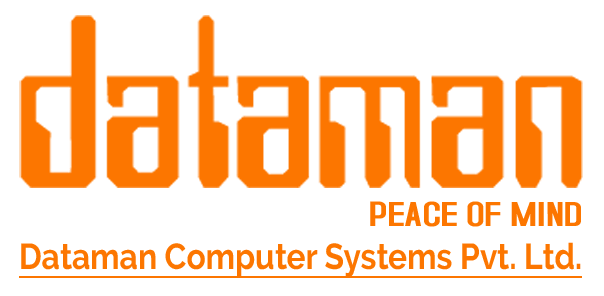- +91 9511117684
- shweta@dataman.in
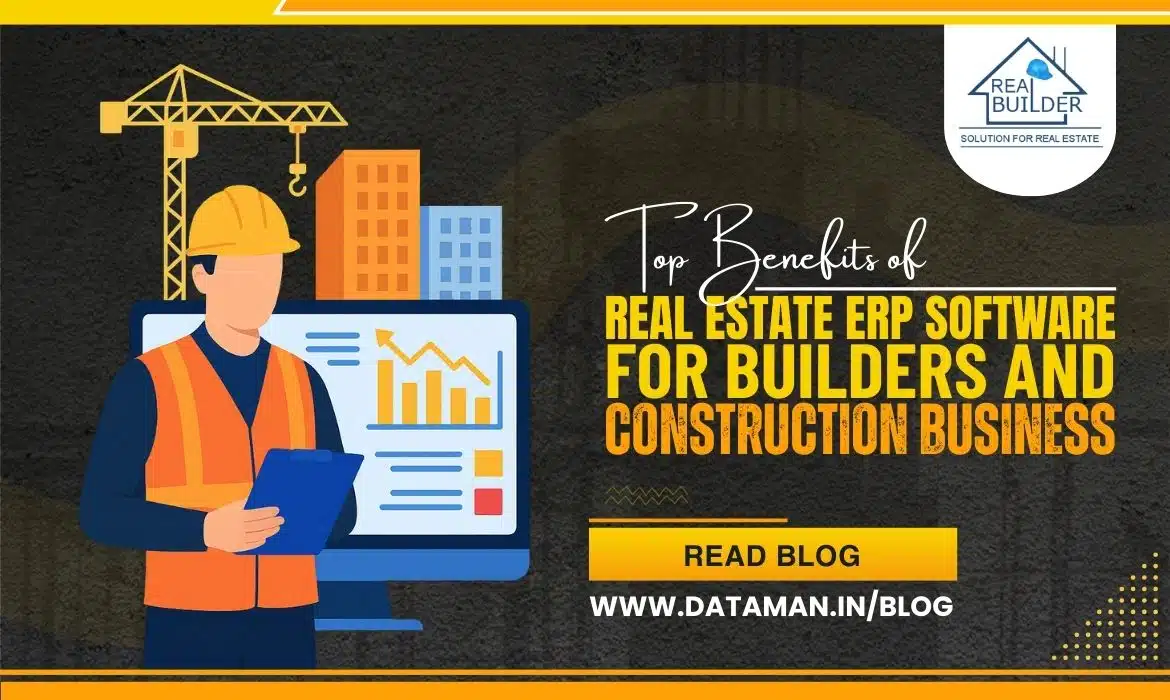
Table of Contents
Post Views: 662
Real estate ERP software is becoming more and more popular among builders and construction firms. Your entire workflow is done by this software, which also enhances departmental collaboration and gives you real-time insights to help you make better decisions.
There are a lot of moving components involved in running a construction or real estate company, from overseeing teams and managing projects to managing funds and inventory. All of this can be done by hand, which can result in expensive errors, delays, and missed opportunities.
The main advantages of real estate ERP software and how it helps builders and construction companies increase efficiency and profitability will be covered in this article.
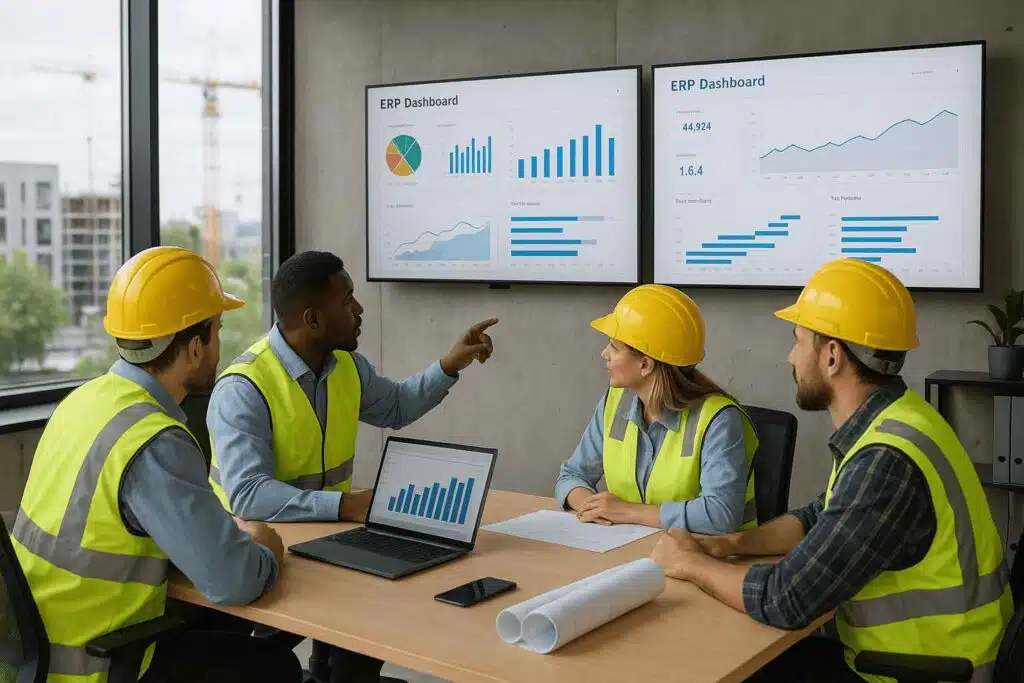
Why Real Estate ERP Software became important for the Construction Business?
Historically, the real estate sector has depended on disjointed systems, such as spreadsheets, emails, and paper-based procedures, which frequently resulted in inefficiencies. Businesses required a more reliable and scalable method of managing operations as project sizes and regulatory requirements increased.
ERP software originated in the manufacturing industry and was progressively modified to satisfy the particular requirements of the real estate industry.
Contractor invoicing, inventory management, and other project-specific issues are now particularly addressed by real estate ERP software.
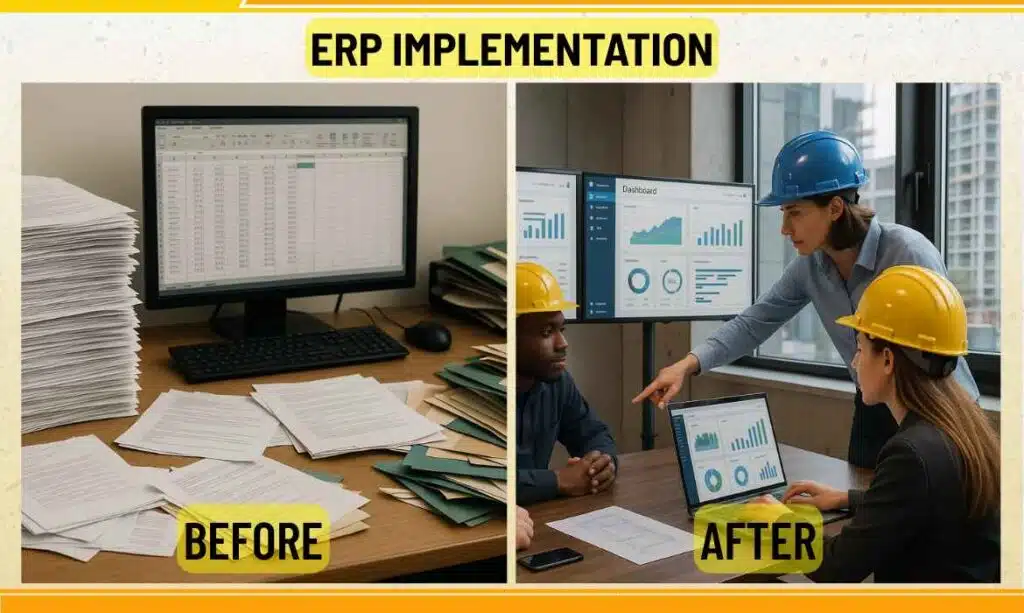
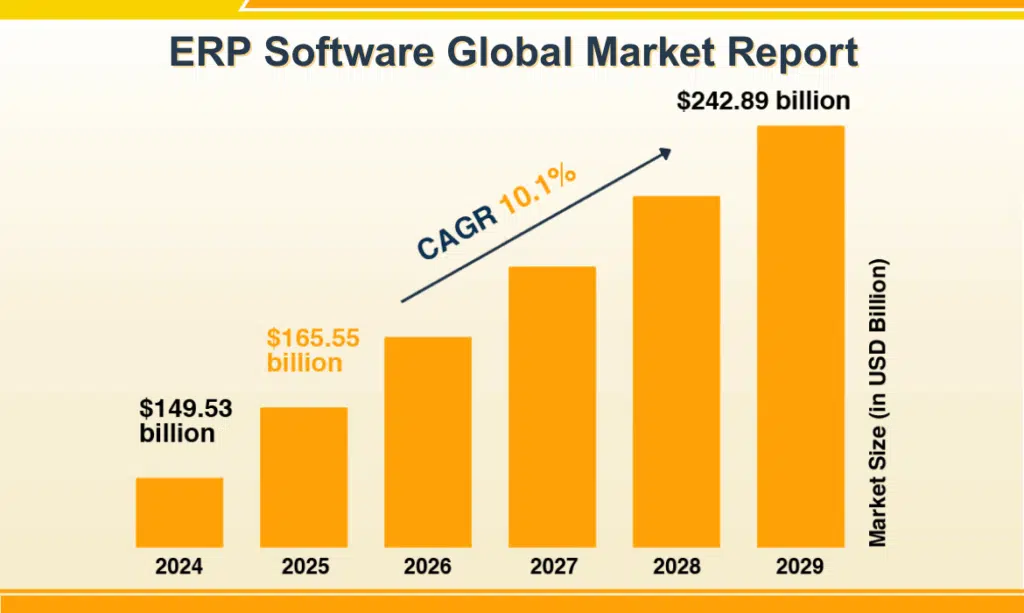
Key Benefits of Real Estate ERP Software
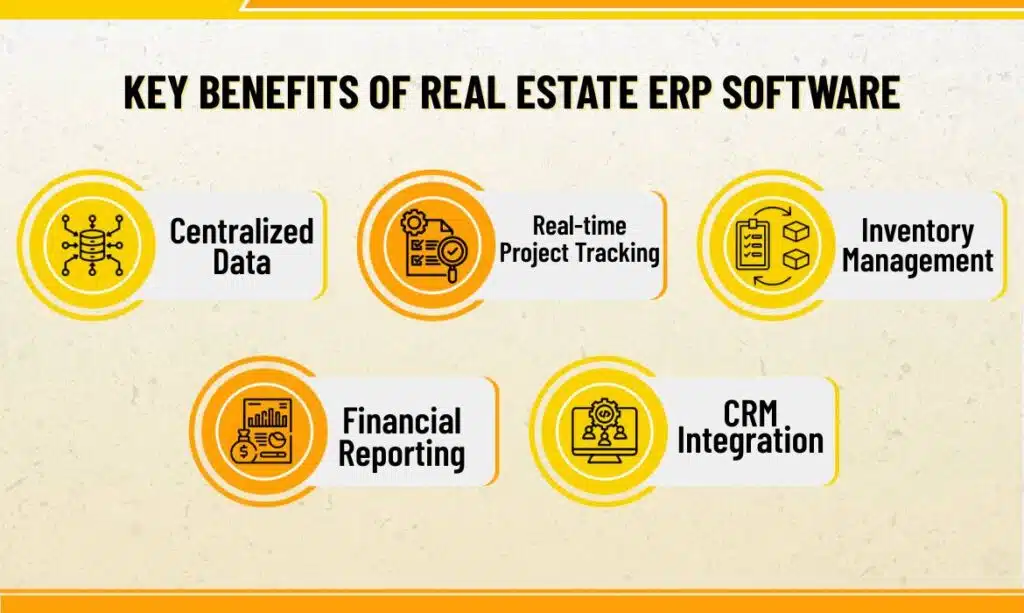
1. Centralized Data Management with Real Estate ERP Software
Managing high volumes of data relating to projects, customers, supplies, workers, and finances is one of the most difficult tasks facing real estate and construction companies.
It’s similar to using a GPS throughout the whole construction process because you can always tell where you are and what’s coming up next.
2. Enhanced Project Management
Workforce allocation, material procurement, vendor coordination, and timeline tracking are just a few of the many moving components that make up construction projects.
Strong project management capabilities that guarantee efficient execution are provided by an ERP solution.
Benefits:
- Makes it possible to track project schedules and milestones in real time.
- Improves departmental cooperation.
- Actively solves problems and aids in risk assessment.
3. Efficient Financial and Accounting Processes
Because real estate and construction companies deal with a variety of activities, such as tax computations, employee salaries, vendor payments, and client billing, managing money can be challenging.
The accuracy of financial procedures is improved and simplified by ERP systems.
Benefits:
- Generates and processes invoices automatically.
- Ensures that tax laws are followed.
- Improves budgeting by offering comprehensive financial reports.
4. Optimized Inventory and Procurement Management in Real Estate ERP Software
Maintaining appropriate stock levels and cutting waste are made easier for organizations by a strong ERP system. It’s like having an auto-restore system in place, it eliminates stockouts and excessive purchasing.
Benefits:
- Monitors the availability and use of materials.
- Generates purchase orders automatically.
- Avoids shortages and excessive inventory expenditures
5. Improved Transparency and Financial Management
Through the tracking of budgets, expenses, and cash flow between projects, it guarantees stricter control over financial matters.
6. Improved Relationship Management for Customers (CRM)
Lead management, follow-up automation, and customer communication are all facilitated by an integrated CRM.
7. Smooth Procurement and Inventory Management
Purchase planning, stock tracking, and supplier management are all made easier by the software.
8. Documentation and Regulatory Compliance
It guarantees that all governmental and legal obligations are appropriately monitored, preserved, and handled.
9. Enhanced Interdepartmental Communication
ERP promotes real-time cooperation and information exchange by integrating departments.
Tips for Selecting the Best Real Estate ERP Software
Not all ERP systems are made equal, particularly in the construction and real estate industries. Your workflow may be made or broken by your choice.
So, how can you locate the one that fits perfectly?
1. Understand Your Needs To begin.
Make a list of the most difficult issues facing your company first.
Do you mean project tracking? Organize follow-ups? Creating a budget? You’ll be able to identify the capabilities you need in the software once you realize, you are ready to go.
Consider ERP solutions that provide strong inventory and supplier management if you frequently struggle with delayed delivery.
2. Select Software Designed for Real Estate
As there are generic ERP solutions available, a real estate-specific one is more knowledgeable about your industry. Choose systems that can manage land records, bill contractors, and book units, among other tasks.
- Advice: The less you have to modify the software later on, the more industry-focused it is.
3. Being user-friendly is a must.
Your team shouldn’t have to spend hours learning how to use a new system. Select a device that has a clear menu and a clean dashboard for ease of use.
- Ask yourself: Is it possible for someone with no technological experience to utilize this without experiencing any stress?
4. Scalability and Long-Term Thinking
You might have ten projects now, but what about fifty?
Instead of a system that you will outgrow in a year, choose one that will expand with your company.
5. Support Is Very Important
Good support is underestimated. Whether it’s a random glitch on a Monday morning or during onboarding, you want a vendor who will promptly answer the phone or respond to your conversation.
Also Read: How Construction Management Software Maximizes Your Return on Investment (ROI)
Difficulties with Real Estate ERP Software
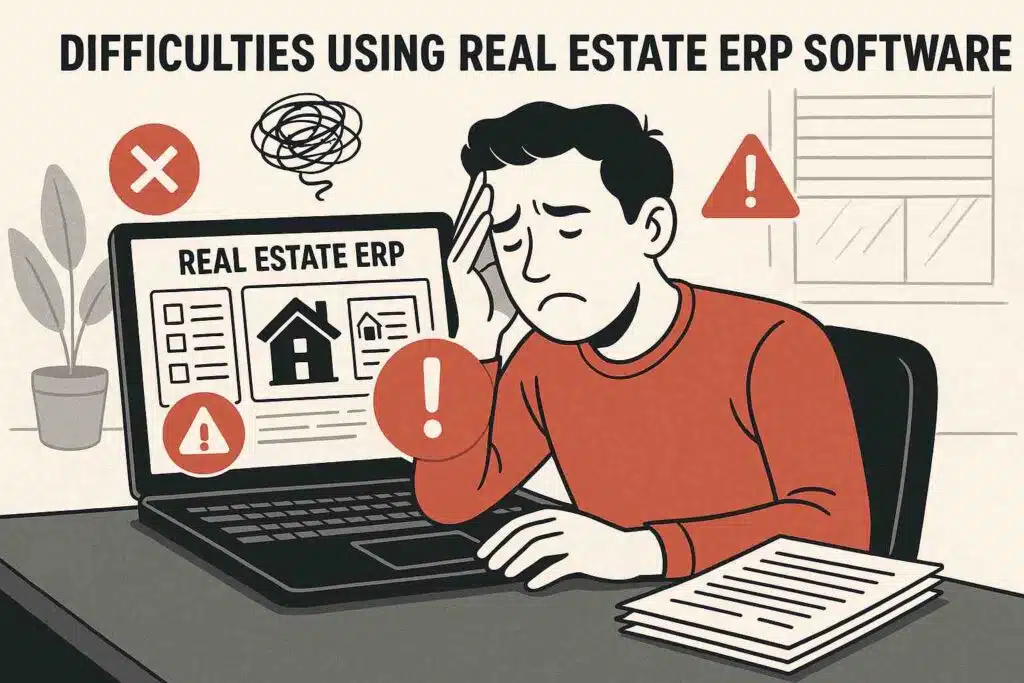
ERP installation may provide difficulties despite its benefits, such as integration difficulties and change aversion.
Common Challenges:
- Employee Adoption: A few employees could find it difficult to get used to the new system. The transition can be made easier by providing appropriate training.
- Value vs. Cost: ERP software can be expensive, but in the long run, the advantages exceed the drawbacks.
- Integration Problems: Compatibility with current tools and software must be guaranteed for implementation to go smoothly.
Why is Dataman’s Real Builder ERP the best for your business?
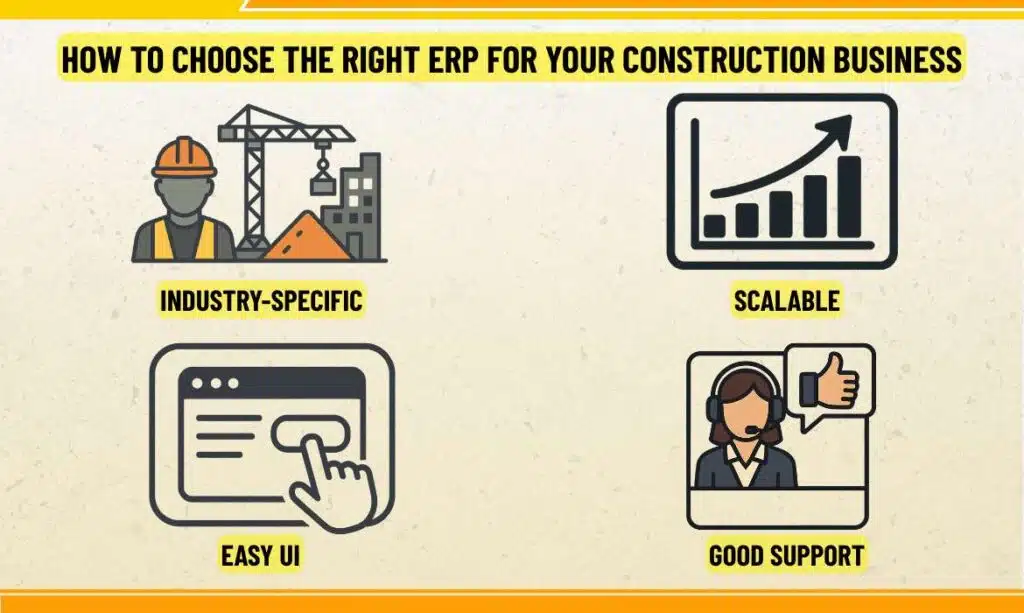
If you’re searching for an ERP, Dataman’s Real Builder ERP comprehends the daily difficulties of the construction industry.
Since it is made especially for contractors, real estate developers, and construction companies, it does not aim to please everyone.
It simply fulfills the needs of construction companies and does it effectively.
This is how it differs from other ERP software:
- Constructed by Professionals With Construction knowledge
- Real-Time Reports and Insights
- Adaptable and Modular
- Builders All Throughout India Trust Us
- Beneficial Assistance That Remains After You Purchase
Conclusion
Real estate ERP software has become essential in today’s regulated construction sector. ERP solutions enable builders to function more effectively and make more informed business decisions, from centralized project management and real-time financial tracking to streamlined procurement and CRM integration.
Construction businesses may obtain customized capabilities like contractor billing, land record management, and real-time insights that generic systems just cannot match by selecting an industry-specific ERP, such as Dataman’s Real Builder ERP.
ERP software helps construction organizations increase financial accuracy and project management. ERP systems concentrate data to improve decision-making
FAQ (Frequently Asked Questions)
1. Is ERP software truly helpful? I’m tired of handling everything by hand.
Yes, definitely. ERP software can be really helpful if you’re juggling spreadsheets, papers, and several phone calls just to keep track of a project. It keeps you organized and in charge by centralizing all of your finances, schedules, supplies, and payments.
2. How does ERP help my construction company specifically?
You may think of it as your central command center. From one dashboard, it facilitates project planning, personnel management, inventory tracking, billing, and even client communication. Eliminate disorganized systems and ongoing follow-ups.
3. Is ERP software truly necessary when I already have systems in place?
It’s likely that you are losing time and overlooking things if you use a variety of spreadsheets, emails, and other applications. Because ERP centralizes everything, your procedures become more accurate, quicker, and far less stressful.
4. Will the non-tech person be able to use this?
True! The most effective ERP systems for the construction industry, such as Dataman’s Real Builder ERP, are designed to be easy to use. To utilize it, you don’t have to be a tech expert. Simple navigation and clear dashboards make it easy for anyone to learn.
5. Doesn’t ERP software cost a lot for small construction companies?
Not exactly. You can begin with just the capabilities you require and add more as your business expands, because many ERP systems are modular. Furthermore, the time and money you save over time typically exceed the initial investment.
6. What distinguishes Dataman’s Real Builder ERP from other software?
It was created especially for Indian builders, contractors, and real estate developers. It does this without requiring you to modify a generic tool since it recognizes and manages specific areas, such as contractor billing, land records, and unit booking.
Searching for the best Real Estate ERP Software? Get in touch with us right now.
0
